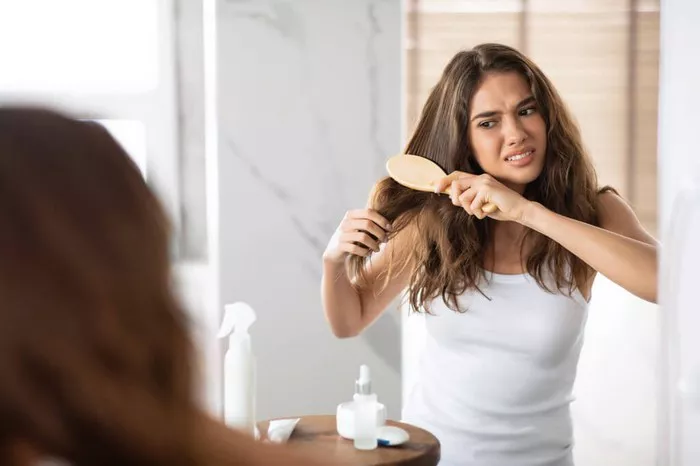Hair loss in women can be a distressing experience, and its causes are often multifaceted. While genetic factors, hormonal changes, and medical conditions play a role, diet and nutrition also contribute significantly. In this comprehensive guide, we will delve into the connection between female hair loss, diet, and nutrition. Understanding how dietary choices impact hair health can empower women to make informed decisions for managing and preventing hair loss.
I. Nutrient Deficiencies and Hair Loss
1. Iron Deficiency:
Iron deficiency is a common cause of hair loss in women. Iron is vital for hair growth, and insufficient levels can lead to weakened hair follicles and increased shedding.
2. Vitamin D Insufficiency:
Vitamin D is essential for maintaining healthy hair follicles. Inadequate levels of this vitamin may contribute to hair thinning and increased vulnerability to hair loss.
3. Lack of B Vitamins:
B vitamins, including biotin, play a crucial role in hair health. Deficiencies in these vitamins can result in hair thinning and slow growth.
II. Building a Hair-Healthy Diet
1. Protein-Rich Foods:
Protein is a fundamental building block for hair. Including sources of lean protein, such as poultry, fish, beans, and nuts, supports hair structure and growth.
2. Iron-Boosting Foods:
Consuming iron-rich foods like red meat, spinach, lentils, and fortified cereals helps combat iron deficiency and promotes optimal hair health.
3. Omega-3 Fatty Acids:
Omega-3 fatty acids, found in fatty fish, flaxseeds, and walnuts, contribute to a healthy scalp and may help prevent hair loss.
III. Foods to Include in a Hair-Healthy Diet
1. Dark Leafy Greens:
Spinach and kale are rich in iron, vitamins A and C, and other nutrients that support hair health.
2. Eggs:
Eggs are an excellent source of protein, biotin, and essential minerals like zinc and selenium, all crucial for strong, healthy hair.
3. Nuts and Seeds:
Almonds, walnuts, and flaxseeds provide omega-3 fatty acids, zinc, and selenium, promoting overall hair wellness.
IV. Potential Culprits: Foods that May Contribute to Hair Loss
1. Sugary and Processed Foods:
Diets high in sugar and processed foods can contribute to inflammation, potentially impacting hair health. Choosing whole, nutrient-dense foods is advisable.
2. Crash Diets:
Extreme calorie restriction and crash diets may lead to nutrient deficiencies, adversely affecting hair growth. Maintaining a balanced, sustainable diet is key.
3. Excessive Vitamin A:
While vitamin A is essential, excessive intake from supplements can have adverse effects on hair. Moderation is crucial for optimal results.
V. Frequently Asked Questions
Q1: Can nutritional supplements prevent hair loss in women?
Nutritional supplements, when used to address specific deficiencies, can contribute to maintaining healthy hair. However, it’s essential to consult with a healthcare professional before starting any supplements.
Q2: Are there specific diets known to promote hair health in women?
Diets rich in nutrient-dense foods such as fruits, vegetables, lean proteins, and healthy fats contribute to overall hair health. There’s no one-size-fits-all diet, but a balanced, varied approach is beneficial.
Q3: Can stress contribute to hair loss in women?
Yes, chronic stress can contribute to hair loss. Stress management techniques, including exercise, meditation, and adequate sleep, can positively impact both mental well-being and hair health.
Q4: How long does it take to see improvements in hair health through dietary changes?
Results vary, but consistent dietary changes may lead to improvements in hair health within a few months to a year. Patience and long-term commitment are essential.
Q5: Can hormonal changes during pregnancy contribute to temporary hair loss?
Hormonal changes during pregnancy can cause temporary hair loss, but this is often reversible postpartum. Consultation with a healthcare professional is advised for persistent concerns.
Q6: Are there specific foods that should be avoided to prevent hair loss?
While nutrient-dense foods support hair health, it’s advisable to limit consumption of sugary and processed foods. Additionally, excessive intake of certain vitamins, like vitamin A, should be avoided.
Q7: How often should a woman get her nutrient levels checked for potential deficiencies related to hair loss?
The frequency of nutrient level checks depends on individual health and dietary habits. Women with concerns about hair loss or nutritional deficiencies should consult with a healthcare professional for personalized guidance.

